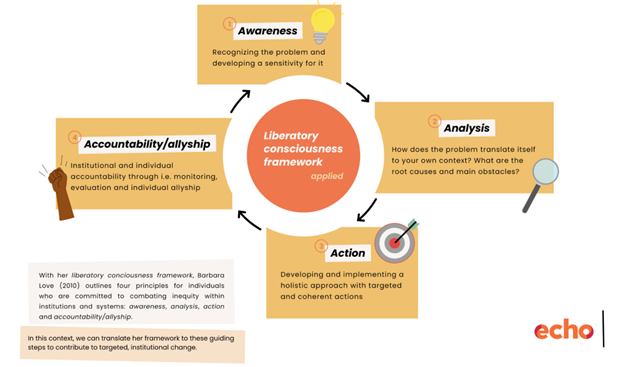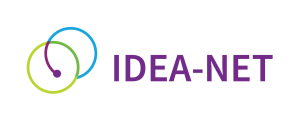In this module, we focus on formulating next steps for IDEA at your institution. This should be used as a closing module after a longer capacity building process with professionals at your institution, for example at the end of a workshop day or training sessions focusing on IDEA.
We use an adaptation of Barbara Love’s (2010) liberatory consciousness framework to guide this process (figure 12). In her framework, Love outlines four principles for individuals committed to challenge inequity within institutions and systems: awareness, analysis, action and accountability/allyship. These principles aim to foster a mindset and practice that supports justice, equity, and liberation for all.
In this specific context, we understand these principles as follows:
- Awareness: Recognizing and understanding the existence of inequities and how they operate at individual, institutional, and systemic levels is our starting point. This involves continuous self-reflection and learning about privilege, power, and marginalization. This is what the previous modules aim to contribute to.
- Analysis: This involves developing a deeper understanding of the causes and mechanisms of exclusion and marginalization. To analyze means to connect personal experiences to broader social structures and histories, and identifying patterns and systems of injustice. In this context, we aim to analyze how inequities translate to and manifest in your institution. This can for example mean you consider how exclusion affects certain groups in the classroom, in HR practices, in (the lack of) support services, etc. It is essential to conduct this analysis, as simply implementing good practices from other institutions can lead to ineffective interventions that do not fit your institutional context.
- Action: Action means taking intentional steps to challenge and disrupt inequities. This includes speaking out, organizing, supporting others, and creating change through daily behaviors and larger movements. In this context, it can also mean designing and implementing IDEA at your institution.
- Accountability/allyship: This involves being responsible for one’s role in sustaining or dismantling oppression. It involves listening, learning from marginalized communities, building trust, and acting in solidarity with integrity and humility. In this context, it can also relate to monitoring, evaluating and being accountable for implemented IDEA-initiatives.
As this is a closing workshop to develop the next steps for IDEA at your institution, we focus on the principles Analysis and Action in this module’s activity.

- Identifying and analyzing IDEA-related problems and opportunities at your institution
- Creating actionable next steps targeting these problems and opportunities to advance IDEA in your context
In a group setting, this should be used as a closing activity after a longer capacity building process with professionals at your institution, for example at the end of a workshop day or training sessions focusing on IDEA. Adapt the activity according to your context and group.
For who: Higher education professionals, administrative staff, students, and/or others looking to co-create a strategy for IDEA at their institution. Ideally, this co-creation should take place with a diverse representation of the institution and target groups, to contribute to a participatory, equitable and effective IDEA strategy.
Instructions:
- Start by briefly introducing the liberatory consciousness framework using the information and slides in this module, emphasizing that it is essential to have an awareness of IDEA and to analyze our context before jumping into actions and strategy.
- Then, either as a central discussion or first in groups, take some time to make a (visual) overview of the key acute problems/opportunities at your institution related to IDEA. Many of these have most likely already come up in discussions if this module is done at the end of a longer process of capacity building. Ask participants to reflect once more on what has been discussed and what else they have identified. They can for example discuss this in groups and write down their ideas on post-its to make a collective overview of the key problems/opportunities.
- Once an overview of the problems at hand has been created, invite the participants to come up with a targeted approach for next steps related to IDEA at their institution. You can use the think-pair-share method for equal participation:
- Think: Brainstorm individually (3min) – Come up with max. 4 interventions/ideas/actions that could potentially tackle the problems/opportunities we have identified.
- Pair: Compare in pairs (10 min) – Compare your lists and narrow down to 4 interventions combined.
- Synthesize in groups (30-40 min) Compare your lists, narrow down again & prioritize! Also consider: who and what is needed to take the first next steps?
- Share: Present action plan to other participants
- After the workshop, the action plans can be used as a basis to formulate a concrete IDEA-net strategy at your institution.
Love, B. J. (2010). Developing a liberatory consciousness. In M. Adams, W. J. Blumenfeld, C. R. Casteneda, H. W. Hackman, M. L. Peters, & X. Zuniga (Eds.), Readings for diversity and social justice (pp. 533-540). Routledge.
IDEA-net database – examples of worldwide IDEA offices and initiatives https://idea-net.eu/idea-net-cases/
MultInclude – database and analysis of 70+ evidence based practices to promote
inclusion in higher education https://multinclude.eu/
IDEA-net Guidelines Toolkit for setting up an IDEA office https://idea-net.eu/guideline-toolkit/
Erasmus University (EUR) Inclusive HR Toolkit for inclusive selection & recruitment https://www.eur.nl/en/media/2021-04-engbrochurewstoolkit21112018en
IDEA-net Guidelines Toolkit for setting up an IDEA office https://idea-net.eu/guideline-toolkit/
Erasmus University (EUR) Inclusive HR Toolkit for inclusive selection & recruitment https://www.eur.nl/en/media/2021-04-engbrochurewstoolkit21112018en
IDEA-net database – examples of worldwide IDEA offices and initiatives https://idea-net.eu/idea-net-cases/
MultInclude – database and analysis of 70+ evidence based practices to promote inclusion in higher education https://multinclude.eu/

